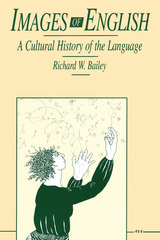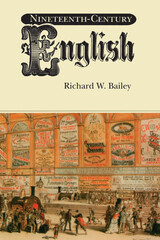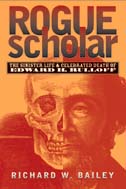4 books about Bailey, Richard W.

Images of English
A Cultural History of the Language
Richard W. Bailey
University of Michigan Press, 1993
Images of English demonstrates how people's opinions about the English language often reflect prejudice and hope, bigotry and pride, scorn and celebration. The book offers a fascinating perspective on attitudes toward the English language--the rise and fall of ideas that English is nearly perfect or tumbling into decline.
[more]

Milestones in the History of English in America, Volume 76
Allen Walker Read, Richard W. Bailey, editor
Duke University Press
A collection of essays by one of the premier historians of American English, Milestones in the History of English in America is a remarkable introduction to Allen Walker Read’s work and the ways in which archival materials can illuminate linguistic history. This volume is divided into four sections: the emergence of American English as a distinct form and the attitudes of both Britons and Americans toward its development; the history of the most distinctive and widespread American coinage, "O.K."; euphemism and obscenity; and an autobiographical section that provides a fascinating portrait of a remarkable American scholar.
[more]

Nineteenth-Century English
Richard W. Bailey
University of Michigan Press, 1998
Jane Austen's English is far different from Virginia Woolf's, but historians of the English language have given scant attention to the ways in which English changed over the course of the nineteenth century. In Nineteenth-Century English, Richard W. Bailey treads new ground by showing the extent to which the language changed as cultural and economic transformations brought us into the modern world.
Six aspects of nineteenth-century English are treated in separate chapters: writing, sounds, words, slang, grammar, and "voices." In each domain, innovation and obsolescence are discussed as they were observed by contemporary writers. Thus Bailey shows how linguistic details gained powerful social meaning in the emergent stratification by class, region, race, and gender of the anglophone community.
At the beginning of the century, the "Italian" sound of a in dance was thought to be an intolerable vulgarity; by the end, it was a sign of the highest refinement. At the beginning, OK had yet to be invented; by the end, it was being used in nearly all varieties of English and had appeared as a loanword in many languages touched by English. At the beginning, mixed forms of English--pidgins and creoles--were little known and thoroughly despised; by the end some of them had become vehicles for Bible translation. As English became a global language, it took on the local color of its surroundings, and proper usage became ever more important as an index of social worth, as a measure of intelligence, and as a gauge to a person's suitability for employment, often resulting in painful consequences. What the language was like changed dramatically. What people thought about the language changed even more.
"The tale that Bailey has to tell . . . is little short of enthralling. Drawing on previously neglected material--novels, magazines, letters and diaries--he shows how the language came into the century a Georgian popinjay and left it a sober-suited man of business, purged of quirks and flashy curiosities. Along the way, Bailey uncovers a language which, while it seems familiar enough on the printed page of a Jane Austen novel, was actually quite different from the English we use today. . . ." --Robert McCrum, Observer (London)
Language changes as time goes by. Modern listeners can barely comprehend Old and Middle English. Although we are able to understand nineteenth-century English, the language changed with the effects of industrialization, urbanization, bilingualism, and growing literacy. In this book, Richard Bailey uses numerous examples and illustrations to demonstrate the changes in English. Furthermore, he identifies the connections between social events and linguistic transformation.
". . . a highly engaging study of a broad and difficult subject. Bailey is an excellent writer--the chapters are well-organized and written in a vigorous style that is buoyed by a wry sense of humor. . . ." --Lexicographia
". . . entertaining, lucid, packed with detail, and refreshingly alert to the arresting quotation. If it is unusual to associate pleasurable reading with the scholarly analysis of language, Bailey also makes clear the serious philological and political implications of his study." -- Times Literary Supplement
Richard Bailey is Professor of English, University of Michigan, and is known internationally as an expert on social and regional varieties of English.
[more]

Rogue Scholar
The Sinister Life and Celebrated Death of Edward H. Rulloff
Richard W. Bailey
University of Michigan Press, 2003
This is the tale of the insalubrious and utterly failed life of the notorious nineteenth-century thief, murderer, professional impostor, and would-be philologist Edward Rulloff, who was condemned to die and hanged for his crimes. The life of Rulloff is a sordid account of misguided genius and abysmal consequences. Those who loved him courted disaster, and, in every case, the courtship flowered into catastrophe.
Richard Bailey's narrative, calm and impartial yet spiked with wit and suspense, captures perfectly the slightly haunted and overwrought air of Victorian rural America, calling on newspaper accounts, interviews, and eyewitness reports of the day. Inevitably, the quiet accumulation of details builds to a story that transcends its individual events to touch on the universal themes of any age.
Rogue Scholar is about the evil of one man who lived a life of deception and crime. Yet in a larger sense it is also the portrait of a condemned soul in its final hours, an examination of the death penalty, and a reminder that media sensationalism is nothing new.
Richard Bailey's narrative, calm and impartial yet spiked with wit and suspense, captures perfectly the slightly haunted and overwrought air of Victorian rural America, calling on newspaper accounts, interviews, and eyewitness reports of the day. Inevitably, the quiet accumulation of details builds to a story that transcends its individual events to touch on the universal themes of any age.
Rogue Scholar is about the evil of one man who lived a life of deception and crime. Yet in a larger sense it is also the portrait of a condemned soul in its final hours, an examination of the death penalty, and a reminder that media sensationalism is nothing new.
[more]
READERS
Browse our collection.
PUBLISHERS
See BiblioVault's publisher services.
STUDENT SERVICES
Files for college accessibility offices.
UChicago Accessibility Resources
home | accessibility | search | about | contact us
BiblioVault ® 2001 - 2024
The University of Chicago Press









